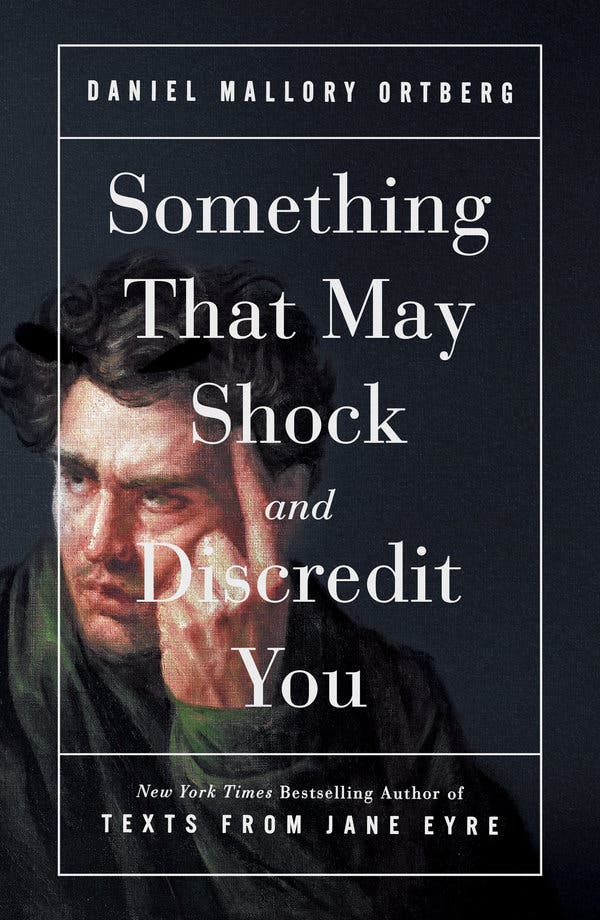SOMETHING THAT MAY SHOCK AND DISCREDIT YOU
By Daniel Mallory Ortberg
At last, we have the work of transgender bathos we didn’t know we needed, but very much do.
No, I don’t mean pathos. I mean the term coined by Alexander Pope to signify “the art of sinking in poetry,” as does Daniel Mallory Ortberg. In the essay collection “Something That May Shock and Discredit You,” he uses the 18th-century term for “anticlimax” as an excellent, if surprising, vehicle for writing that he calls, in the acknowledgments, “memoir-adjacent.”
“I used to have the hardest time remembering the difference between bathos and pathos,” Ortberg — who, since the book’s publication, has changed his name to Daniel M. Lavery — winks, in a clue to his book’s method, of lampooning the self-seriousness of masculinity. In contrast to the mock chapter titles he lists in “the On the Nose, Po-Faced Transmasculine Memoir I Am Trying Not to Write,” his chapters will include no “Forced Poetic Description of My Hormone Delivery System,” nor an “Exhaustive Recounting of Every Crush I Have Ever Had.” Rejecting the suffering bildung often demanded of transgender writers, Ortberg’s narrative is anything but linear: It skips back in time to mythic Greece, traipses across the landscape of contemporary pop culture and, in one wonderfully fabulist entry that would make Carmen Maria Machado proud, slips outside of time altogether.

[Read an excerpt from “Something That May Shock and Discredit You.” ]
Such temporal vertigo makes “Something That May Shock and Discredit You” addictively strange and delightful, as when Ortberg recollects his youthful efforts to attract a crush by “toasting every waffle in the house, trying to alchemize Eggos into a kiss.” In the hands of another author this image could lead somewhere treacly, but Ortberg détournes his own pubescent angst by way of Apollo and Hyacinthus’ doomed romance, putting the “ultima” back in Ultimate Frisbee: “I saw you noticed me taking my shirt off. You probably recognize me — you know, from statues?” Ortberg imagines Apollo saying to the young Spartan prince. Hyacinthus replies, “are you up” and then “if so do you want to play frisbee and die for each other.”
Ortberg delights in masculinity even while wondering at the ridiculousness of its gravitas — of the “baffling little burr of my new vocal cords,” of the fantasy of maleness as consumption without guilt, a life of just inhaling “whatever number of pancakes.” Ortberg’s transition is mercifully free of grim stoicism, flexing instead an array of satiric voices, chief among them riffs on Christian parable. These, in fact, are the affective heart of the book, and allow Ortberg to summon the joy of transition without getting mired in agonized (and self-flattering) disclaimers over what it means to adopt the mantle of maleness.
Taking up Corinthians, Ortberg trumpets transition as ecstatic metempsychosis: flesh as the anticipation of resurrection, “an opportunity in the hands of the Lord.” One of our smartest, most inventive humor writers, Ortberg combines bathos and the devotional into a revelation. On transitioning without forfeiting the wisdom “inherited from women,” he addresses readers as Corinthians’ Paul: “What good dwells in them, I am persuaded, dwells in thee also. Within thee, I should clarify! Looks-wise, you’re so masc it makes my teeth hurt.”
Parables sidestep binary logic, polishing instead the lush intricacies of the sacred, where “the body-that-is exists always in anticipation of and conversation with the body-that-will-be.” Is it a stretch to note that Melville’s own ludic fantasy of transformation — whale excreta into blessed ambergris — also draws on Corinthians (“we are sown in dishonor, but raised in glory”)? Well, I’m making a point about genre-pushing bathos etched in a religious key, and about Ortberg as a lapidarist of gender transition. By broadening what transgender memoir can do, the author is in good company with Viviane Namaste, who decades ago diagnosed autobiography as “the only discourse in which transsexuals are permitted to speak.”
Ortberg partakes of neither the damaging trope of tragic transness nor the sentimental sanctimony that we are “permitted,” offering instead the comic and the transcendent. As he demurs, “I have been a mystery, and I have been changed, and I have been first natural and afterward spiritual.”
 EU News Digest Latest News & Updates
EU News Digest Latest News & Updates



